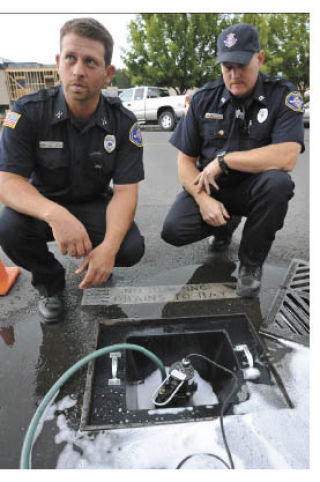In an effort to begin to address the pollution running off our streets and into the bay, the Town of Friday Harbor has purchased a wastewater catchment system for town and charity use.
The car wash kit, now being used regularly by the town Fire Department, fits into the standard-size storm drain openings and catches detergents and other runoff and pumps them through a hose to a nearby sanitary sewer for conventional wastewater treatment.
Town Fire Chief Vern Long became aware of detergents polluting the harbor earlier this spring when Dr. Mike Kaill, who oversees the Spring Street Aquarium, noticed that many of the aquarium’s filter feeders, including several species of anemones, were dying.
Kaill brought the problem to the attention of town authorities. Kaill tested the water with a kit provided by the town and has measured detergent levels at one storm drain at well above the legal limit of .5 parts per million (ppm), with one drain near B Street and Nichols Street at over 3.0 ppm. A reading of 1.5 ppm is toxic to trout.
When Long found a car wash kit, called a SudSafe, that collects detergent runoff and captures it before it can go into the drain, he asked Town Administrator King Fitch when he should buy one.
“Yesterday,” Long quoted Fitch as saying. The kit cost the town $462.
“We’re out here washing our equipment all the time,” Long said, “and while we’ve switched to a more environmentally friendly form of suds — boat soap — we were still looking for ways we could do more.”
Town officials say it’s difficult to pinpoint the source of the detergent problem, and to determine if it is a single source that’s responsible for elevated detergent levels in the harbor or an accumulation of pollutants over time.
At street sewer drains, the town has stenciled warning signs on the pavement, “No dumping, drains to bay,” with the image of a porpoise, in an attempt to help citizens understand that what people dump into the street, or wash down their driveway goes directly into the bay.
“There is probably is a misconception among many people that what goes down a storm drain goes through some sort of treatment, and in an urban environment, that’s generally not the case,” Fitch said.
Fitch updated the Town Council Thursday of the progress on the issue.
“I just think it will take an awfully long time to educate the public about what goes down the drain,” Fitch said Thursday. “It’s going to be a long battle to get rid of detergents in the bay.”
Kaill, a retired research supervisor for the Alaska Department of Fish and Game, holds a Ph.D. in zoology from Cornell University, has been caring for the critters in the public aquarium since it was installed seven years ago.
Kaill lost an 8-year-old painted anemone over the winter, and through a process of deduction and testing, discovered elevated levels of detergents collecting in both the silt layer of his tanks. He traced those detergents to the stormwater pipes that funnel street runoff into the harbor.
Lately, he’s been having difficulty with other species in his tanks as well. “Within the last few months, I’ve been unable to keep the plumose anemone and scallops alive,” he said.
Kaill spoke with Naknek Dive Shop owner Kurt Long, who has seen the marine life throughout the harbor.
“Under the port’s dock, I’m seeing a lot more anemones, scallops, sponges, nudibranchs – all that kind of stuff. Under the Spring Street dock, I’m seeing the same types of things, but in smaller quantities and smaller sizes,” Long said.
Kaill contacted the state Department of Ecology, which sent an inspector, Kurt Baumgarten, to visit. Upon Baumgarten’s arrival, July 29, he noticed a detergent plume 40 to 50 feet wide welcoming him and took photographs of it, Kaill said.
Baumgarten made short work of determining the severity of the problem and assigned a tracking system case number to the situation for further action and follow-up.
In the meantime, town authorities have been working with local businesses that drain into the system to make improvements in how wastewater is handled.
Jessica Johnson, branch manager for Wells Fargo Bank, a popular site for charity car washes, knows that the town has the car wash kit and will try and work with town officials to find a solution for events that happen there.
“We’re not having any washes in our lot until we find out what’s going on,” Johnson said.



